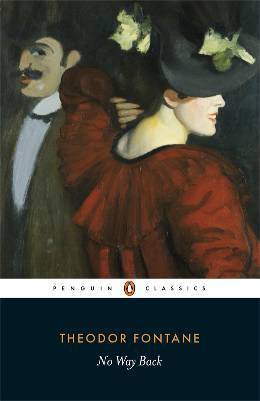What do you think?
Rate this book


256 pages, Paperback
First published January 1, 1891

"Hier ist die Grenze, Ebba. Wollen wir darüber hinaus?"Do they cross that line? Well, this is the 19th century, so the door closes behind Holk when he enters Ebba's room. Whatever happens in the hour before a portentous rap at that door is immaterial. The damage has long been done. There is no way back, as the title says. What is lost cannot be recovered.
As he came upstairs, Ebba was standing in her open door and the lights were still burning. Holk felt some doubt whether she had merely been waiting for all the guests to depart, or for him to return. “Good night,” she said and with a mock-solemn bow seemed to be on the point of going back into her room. But Holk seized her by the hand and said: “No, Ebba, you mustn’t go like that. You must listen to me.” And following her into her room he gazed at her with eyes full of a turmoil of passion.
But she gently released herself from his grasp and, alluding to the conversation of a few minutes ago, said: “Well, Helmut, what role are you playing now? Paris or Aegisthus? You heard that Pentz has volunteered for one of them.”
And she laughed.
But her laugh only increased Holk’s confusion, which she continued to enjoy for a moment and then, half-pityingly, she said: “Helmut, you really are more German than the Germans….It took ten years to conquer Troy. That seems to be your idea, too….”
{Chapter 27}
An hour later there was a knock at the door. Holk started up; but Ebba, less afraid of being discovered than of appearing ridiculous by anxiously trying to avoid discovery, went quickly to the door and opened it. (pp. 200-201)
After he had read the letter, Holk felt somewhat sentimental. It contained so much affection that it revived memories of past happiness. She was still the best of them all. What was the beautiful Brigitte by comparison? Yes, and what was Ebba, even, by comparison? Ebba was like a rocket that you followed with an “Ahhh…!” of astonishment as long as it continued to shoot upwards but when it was all over, it was nothing but a firework after all, something completely artificial. Christine, on the other hand, was like the simple, clear light of day. Immersed in this feeling, he quickly read through the letter again, only to find that his pleasure had quire evaporated, all the pleasant impressions had gone, leaving only one, or predominately one, thing behind: the tone of self-righteousness. And once more his thoughts took their familiar turn: “Oh, these virtuous women! Always sublime, always serving the Truth; and I suppose then even think so themselves. But without wishing to deceive anyone, they deceive themselves. Only one thing is quite certain: their excellence is appalling.” (pp. 137-138)